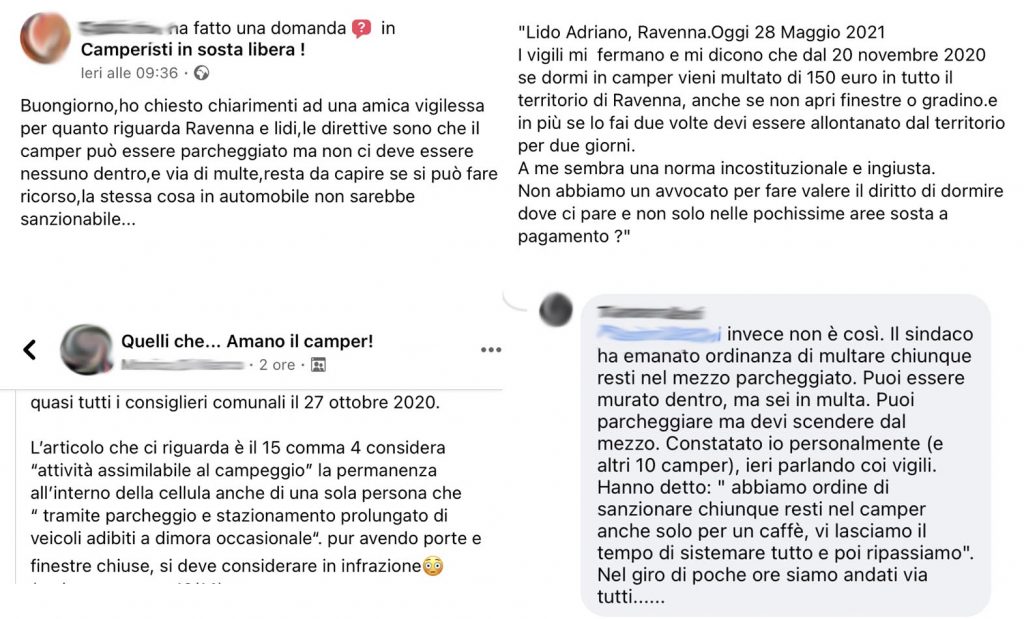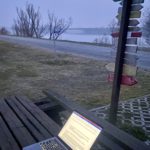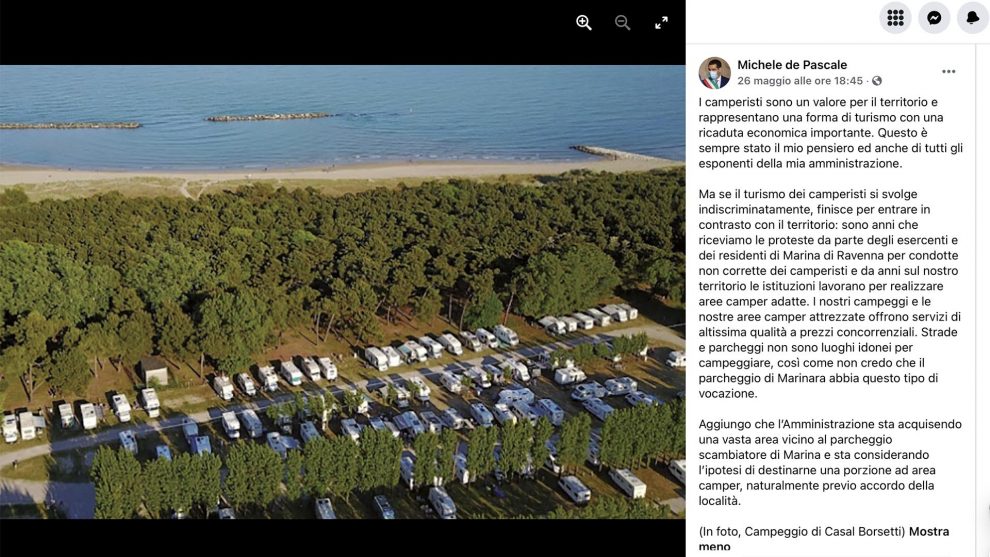May 29, 2021 – Today we want to return to the episodes that are happening in Ravenna, Italy. These days, those who frequent the Italian Facebook groups that talk about motorhomes and itinerant tourism cannot fail to come across protest posts. We addressed the subject a few days ago, when we noticed an article from Il Resto del Carlino written in a questionable way. We then sent an email to the editorial staff and the author, but without getting any response.
Reading that article there remained the doubt about the real reasons for the sanctions, in the sense that we did not know, given that the aforementioned fines were “only” seven, whether they were actual disputes for abusive camping or real fury. The statements by the mayor of Ravenna a couple of days later (which you can see in the image below) have aroused perplexity, despite the conciliatory tones.
In recent days, direct and indirect testimonies have multiplied, which tell how the attitude and complaints of the Ravenna Local Police are decidedly inconsistent with the application of the Italian Traffic Laws and its Art. 185, but apparently not even with the (questionable) provisions of the new Urban Police Regulations approved unanimously, therefore with the support of all parties, by the Ravenna City Council last October: 31 pages and 35 articles that substantially develop the theme of “civil coexistence”. In the wake of the indignation of those who see in itinerant tourism only the evil of the (few) uncivilized and not the (great) opportunity offered by millions of people who have chosen this type of holiday, local politicians have seen fit to insert four paragraphs of article 15 which concern motorhomers.
Here they are:
3. Outside the spaces specifically identified and reserved for them, the permanent occupation of roads or public areas or areas of public use caused by garaging, or by the storage in the period in which they are not used, of campers, caravans, boats and trolleys is prohibited. boats, or other vehicles.
4. Outside of the spaces specifically identified, any activity similar to camping is also forbidden, that is to say occupation of public spaces and areas and subtraction, therefore, of free use from the community, carried out through parking and prolonged parking of vehicles used as accommodation. occasional, positioning in their proximity to chairs and tables, laundry utensils and the like.
5. Anyone who violates the provisions of this article is subject to the administrative sanction of the payment of a sum from Euro 150.00 to Euro 450.00 and the objects used can be removed at the expense of the offenders.
6. Failure to comply with the provisions of this article is subject, where applicable, to the rules referred to in articles 9 and 10 of the D.L. 20 February 2017 n. 14, converted into law 18 April 2017, n. 48.
Paragraph 6, obviously incomprehensible without consulting the law to which it refers, is the one that provides for the immediate removal of the offender for 48 hours, a provision that in case of recidivism can last up to six months.
Very poorly written rules
We are therefore the usual ones, as had already happened for the regional law of Piedmont (read here) on which the ANCC – National Association and Coordination of Motorhomers (read here) tried to clarify, the real problem arises not (or not only) how badly the rules are written, but above all how the police apply them as an individual behavior of the single agent or by virtue of directives that the local commands give to their “envoys in the field”.
On the first issue, that of the legality of the regulation, we think that the ANCC is already moving, while on that of how the rule is applied there is much to verify and discuss. From the testimonies emerging on Facebook (of which you can see some examples in the image below), it seems that the Local Police act by indiscriminately sanctioning those in the vehicle, regardless of whether all the requirements of the Highway Code are respected.

If these behaviors were ascertained and if it became known that they are the result of specific indications from the local command, the situation would be even more serious. The police should at least explain in which interstices of the regulation they have read that being on board the vehicle is an activity similar to camping or clearly indicate how long the parking must last to be considered punishable.
That said, everything would still remain contestable, and we do not doubt it will, with the time it takes for Italian administrative bodies to come to a conclusion: it could take years.
The topic was also addressed by Gianmaria Fabris, in his blog Liberamente in Camper, from a legal point of view and impact on tourism as a whole. Here you can read his interesting speech.
Space for opinions
These were basically the facts, then come the opinions. Ours.
The first is that we live in an absurd society, where the problem is not (only) that there are limiting rules that conflict with the laws of the state, but above all that these LOCAL rules are not advertised. In Italy there are over 8,000 municipalities: how does a motorhome or van driver know all the regulations of the Urban Police or all the prohibition orders? If there are, local administrations must put up signs, exactly as is (rightly) provided for by the Traffic Laws. How is it possible for us to move around Italy and entering any municipal area we run the risk of sanctions that are sometimes embarrassing?
The rest, on the other hand, is more linked to the individual choices of behavior of traveling tourists. In the hundreds of comments that are read these days under the posts that address the “Ravenna problem”, two equally relevant questions arise: “boycott” Ravenna as a tourist destination for motorhomers and use campsites and rest areas instead of stopping freely where It is preferred.
Here’s how we think about it
The first is a fairly blunt weapon: these regulations have precisely the aim of warding off the traveling tourist who, needless to say, brings money to local communities (few or many it does not matter: everyone contributes as he can). Local merchants will certainly see a minus sign in front of their income, but this reduction (especially if not understood) will not lead to significant opinion movements for the administration. So, let’s put our hearts in peace: when the first appeals are won in Ravenna, when the illegitimacy of that regulation is recognized, we will be able to return to visit that destination peacefully. Before then, the uninformed wretches who fall into the network of local regulation will not be missing. This is why it is right to publicize the behavior of that administration: to avoid unfortunate traveling tourists from losing money.
On the second point, we do not agree with those who argue, even among campers, that if you have a recreational vehicle you have to go to accommodation facilities and that’s it, otherwise it is normal to risk being sanctioned. We understand the reasoning of those who once a year go to the beach for 15 days or do a ski week in winter, but itinerant tourism is not only this: it is also made up of people who love to change their destination every day, at every year and in any part of Italy. Even where there are no accommodation facilities; even where the facilities are closed seasonally; even where they are full or too expensive. This is freedom of choice, which must be able to be exercised always and by anyone, in compliance with the laws in force (and not with regulations in conflict with them) and with respect for others. Matter that unfortunately often seems to be lacking at any level.
©2021 seimetri.it – If you want to leave a comment on this article, you can do it on our Facebook page
























